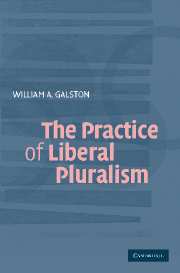Book contents
- Frontmatter
- Contents
- Acknowledgments
- 1 Introduction
- PART I PHILOSOPHICAL FOUNDATIONS OF LIBERAL PLURALISM
- 2 Value Pluralism and Its Critics
- 3 Political Pluralism and Limits on State Power
- 4 Expressive Liberty and Constitutional Democracy: The Case of Freedom of Conscience
- PART II LIBERAL PLURALISM AND PUBLIC ACTION
- PART III POLITICS, MARKETS, AND CIVIC LIFE IN LIBERAL PLURALIST SOCIETIES
- PART IV DEFENDING LIBERAL PLURALISM
- Index
4 - Expressive Liberty and Constitutional Democracy: The Case of Freedom of Conscience
Published online by Cambridge University Press: 18 December 2009
- Frontmatter
- Contents
- Acknowledgments
- 1 Introduction
- PART I PHILOSOPHICAL FOUNDATIONS OF LIBERAL PLURALISM
- 2 Value Pluralism and Its Critics
- 3 Political Pluralism and Limits on State Power
- 4 Expressive Liberty and Constitutional Democracy: The Case of Freedom of Conscience
- PART II LIBERAL PLURALISM AND PUBLIC ACTION
- PART III POLITICS, MARKETS, AND CIVIC LIFE IN LIBERAL PLURALIST SOCIETIES
- PART IV DEFENDING LIBERAL PLURALISM
- Index
Summary
INTRODUCTION
A key concept in my account of limited government is expressive liberty. Simply put, this is the normatively privileged and institutionally defended ability of individuals and groups to lead their lives as they see fit, within the broad range of legitimate variation defined by value pluralism, in accordance with their own understanding of what gives meaning and worth to human existence. In a liberal pluralist regime, a key end is the creation of social space within which expressive liberty may be exercised.
Is expressive liberty (or liberty however understood) anything more than a political construction, subject to alteration through normal political processes? I doubt that theoretical argumentation alone can resolve such questions. So I want to take a different tack – an appeal to moral intuitions and experiences encoded in the U.S. tradition of constitutional adjudication. Specifically, I want to ask how claims based on freedom of conscience are most plausibly understood.
FREEDOM OF CONSCIENCE: TWO CASES
To frame this inquiry, I begin by recalling an important but largely forgotten episode in U.S. constitutional history: a rapid and almost unprecedented turnabout by the Supreme Court on a matter of fundamental importance. I begin my tale in the late 1930s.
Acting under the authority of the state government, the school board of Minersville, Pennsylvania, had required both students and teachers to participate in a daily pledge of allegiance to the flag. In the 1940 case of Minersville v. Gobitis, the Supreme Court decided against a handful of Jehovah's Witnesses who sought to have their children exempted on the grounds that this exercise amounted to a form of idolatry strictly forbidden by their faith.
- Type
- Chapter
- Information
- The Practice of Liberal Pluralism , pp. 45 - 72Publisher: Cambridge University PressPrint publication year: 2004



